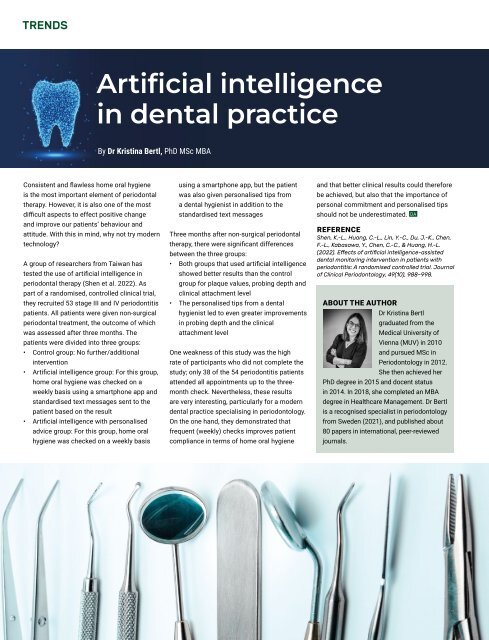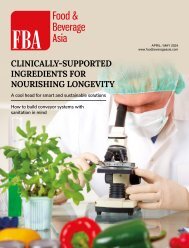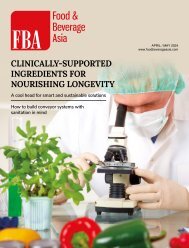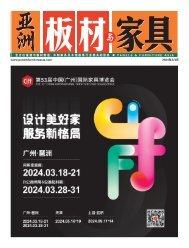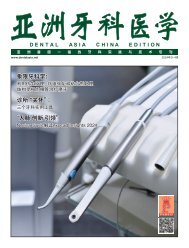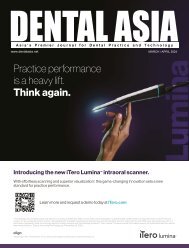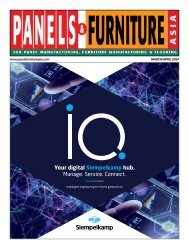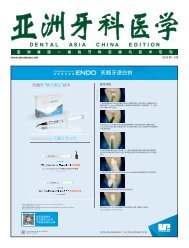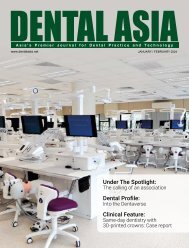Dental Asia March/April 2023
For more than two decades, Dental Asia is the premium journal in linking dental innovators and manufacturers to its rightful audience. We devote ourselves in showcasing the latest dental technology and share evidence-based clinical philosophies to serve as an educational platform to dental professionals. Our combined portfolio of print and digital media also allows us to reach a wider market and secure our position as the leading dental media in the Asia Pacific region while facilitating global interactions among our readers.
For more than two decades, Dental Asia is the premium journal in linking dental innovators
and manufacturers to its rightful audience. We devote ourselves in showcasing the latest dental technology and share evidence-based clinical philosophies to serve as an educational platform to dental professionals. Our combined portfolio of print and digital media also allows us to reach a wider market and secure our position as the leading dental media in the Asia Pacific region while facilitating global interactions among our readers.
Create successful ePaper yourself
Turn your PDF publications into a flip-book with our unique Google optimized e-Paper software.
TRENDS<br />
Artificial intelligence<br />
in dental practice<br />
By Dr Kristina Bertl, PhD MSc MBA<br />
Consistent and flawless home oral hygiene<br />
is the most important element of periodontal<br />
therapy. However, it is also one of the most<br />
difficult aspects to effect positive change<br />
and improve our patients’ behaviour and<br />
attitude. With this in mind, why not try modern<br />
technology?<br />
A group of researchers from Taiwan has<br />
tested the use of artificial intelligence in<br />
periodontal therapy (Shen et al. 2022). As<br />
part of a randomised, controlled clinical trial,<br />
they recruited 53 stage III and IV periodontitis<br />
patients. All patients were given non-surgical<br />
periodontal treatment, the outcome of which<br />
was assessed after three months. The<br />
patients were divided into three groups:<br />
• Control group: No further/additional<br />
intervention<br />
• Artificial intelligence group: For this group,<br />
home oral hygiene was checked on a<br />
weekly basis using a smartphone app and<br />
standardised text messages sent to the<br />
patient based on the result<br />
• Artificial intelligence with personalised<br />
advice group: For this group, home oral<br />
hygiene was checked on a weekly basis<br />
using a smartphone app, but the patient<br />
was also given personalised tips from<br />
a dental hygienist in addition to the<br />
standardised text messages<br />
Three months after non-surgical periodontal<br />
therapy, there were significant differences<br />
between the three groups:<br />
• Both groups that used artificial intelligence<br />
showed better results than the control<br />
group for plaque values, probing depth and<br />
clinical attachment level<br />
• The personalised tips from a dental<br />
hygienist led to even greater improvements<br />
in probing depth and the clinical<br />
attachment level<br />
One weakness of this study was the high<br />
rate of participants who did not complete the<br />
study; only 38 of the 54 periodontitis patients<br />
attended all appointments up to the threemonth<br />
check. Nevertheless, these results<br />
are very interesting, particularly for a modern<br />
dental practice specialising in periodontology.<br />
On the one hand, they demonstrated that<br />
frequent (weekly) checks improves patient<br />
compliance in terms of home oral hygiene<br />
and that better clinical results could therefore<br />
be achieved, but also that the importance of<br />
personal commitment and personalised tips<br />
should not be underestimated. DA<br />
REFERENCE<br />
Shen, K.-L., Huang, C.-L., Lin, Y.-C., Du, J.-K., Chen,<br />
F.-L., Kabasawa, Y., Chen, C.-C., & Huang, H.-L.<br />
(2022). Effects of artificial intelligence-assisted<br />
dental monitoring intervention in patients with<br />
periodontitis: A randomised controlled trial. Journal<br />
of Clinical Periodontology, 49(10), 988–998.<br />
ABOUT THE AUTHOR<br />
Dr Kristina Bertl<br />
graduated from the<br />
Medical University of<br />
Vienna (MUV) in 2010<br />
and pursued MSc in<br />
Periodontology in 2012.<br />
She then achieved her<br />
PhD degree in 2015 and docent status<br />
in 2014. In 2018, she completed an MBA<br />
degree in Healthcare Management. Dr Bertl<br />
is a recognised specialist in periodontology<br />
from Sweden (2021), and published about<br />
80 papers in international, peer-reviewed<br />
journals.


